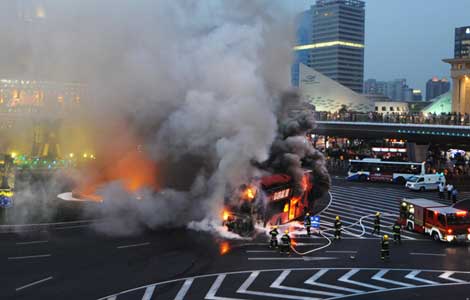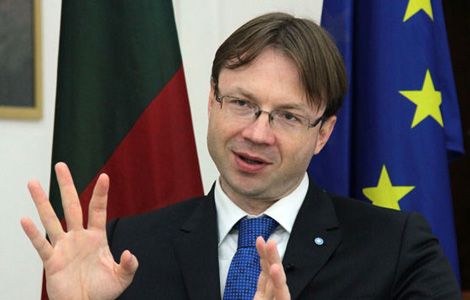Leadership evaluation weighed
Updated: 2013-07-17 07:47
By Zhao Yinan (China Daily)
|
||||||||
Lawmakers should play a greater role in Party oversight, experts say
Experts have called for lawmakers to get more involved in nominating, evaluating and supervising officials, as the Communist Party of China considers reforming how capable leaders are selected.
Jiang Ming'an, a law professor at Peking University, said lawmakers should play a bigger role in selecting capable officials and dismissing incompetent ones, which is a constitutional right but one that has sometimes been undermined.
"It is a feasible and safe way at the moment to introduce forces outside the Party to get involved in the selection of officials. Lawmakers, who are elected from all walks of life, can give a relatively objective assessment of officials," he said.
China has about 27 million lawmakers, who are deputies to the local people's congresses in counties and provinces. But there are fewer than 3,000 deputies to the National People's Congress, the country's top legislature.
All the lawmakers are empowered to elect and approve key figures in the government, courts and prosecutors' offices. They also have the right to address inquiries to State organs.
Jiang said the selection of capable officials is vital to both the country and the Party, so reforms on the selection method can only be done in a gradual and mild way to avoid instability.
"But reform is urgent. Action should be taken immediately to get rid of officials whose behavior is indecent or illegal to improve the image of the Party."
The discussion follows President Xi Jinping's remarks last month on reforming the performance evaluation system for officials.
Xi said at a meeting on June 29 commemorating the founding of the Party that China would not assess the performance of an official simply based on his record of boosting the economy.
Instead, the Party should "adopt more comprehensive criteria for assessing the performance of its officials", he said.
"We should never judge a cadre simply by the growth of gross domestic product," he said, adding that the organization departments, which are responsible for personnel management for the Party, should consider integrity the priority and capability as secondary.
Xi said the Party needs an "efficient and reasonable" system to select and promote good officials that should not be decided by a simple headcount of votes.
Mao Shoulong, a professor on public governance at Renmin University of China, said although China now has inter-Party documents to regulate the selection and promotion of officials, efforts are still needed to improve the transparency of the process and to work out detailed regulations to break down existing stipulations in the Party documents.
"Traditional measurement has put heavy emphasis on economic development, but the public can hardly get a direct benefit from the growth of GDP. The new way should focus more on the public satisfaction of improving livelihood, protecting the environment and maintaining social justice."
The Communist Party of China published a document on the evaluation of local officials, along with several other documents about official's selection, in 2009. The documents stipulate key points in evaluating an official, and say "democratic talks" should be held before a promotion.
"The documents have set up a simple structure for the selection of officials, but real work needs practical and feasible stipulations," Mao said.
Lin Zhe, a professor at the Party School of the Communist Party of China Central Committee, said that although it may be difficult to quickly work out a perfect selection procedure, it is possible to list the behaviors that won't be tolerated.
"While making clear what kinds of qualities are needed in an official, it is equally important for the government to inform officials under what conditions they will be removed once and for all."
zhaoyinan@chinadaily.com.cn
(China Daily USA 07/17/2013 page7)

 Panama finds 'missile equipment' aboard DPRK ship
Panama finds 'missile equipment' aboard DPRK ship
 Free on his feet
Free on his feet
 Extreme heat causing vehicle fires
Extreme heat causing vehicle fires
 Men, you look good in slim elegant cut
Men, you look good in slim elegant cut
 Luxury dresses in plastic
Luxury dresses in plastic
 Obama urges restraint amid protests
Obama urges restraint amid protests
 Putin wants Snowden to go, but asylum not ruled out
Putin wants Snowden to go, but asylum not ruled out
 Apple to probe death of Chinese using charging iPhone
Apple to probe death of Chinese using charging iPhone
Most Viewed
Editor's Picks

|

|

|

|

|

|
Today's Top News
GM's sales up 4% on strong US, China demand
China's US Treasury holdings hit record
New visa law offers lifeline to foreigners
Asiana crash passengers sue Boeing
Li highlights economic restructuring
Merkel's rivals go on attack over US spying
'Missile equipment' found aboard DPRK ship
Egypt's interim govt takes oath
US Weekly

|

|





